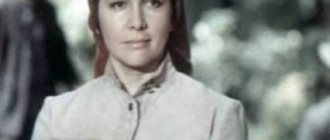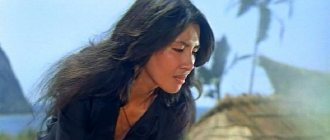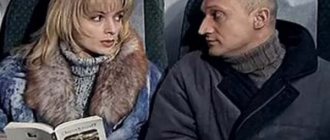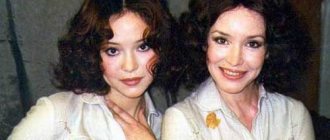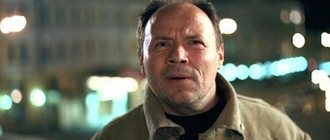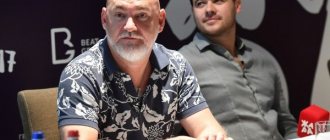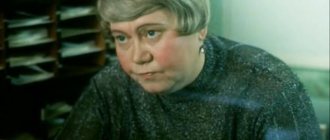Childhood and youth
The director and screenwriter was born in August 1944 in the Karelian town of Kemi, where his father led the Smersh counterintelligence detachment during the war years. After the war, Alexander Solovyov was sent to Pyongyang, where until 1947 he was an adviser to the leader of the North Korean state, Kim Il Sung. After 3 years, the family settled in Leningrad.
Young Sergei began his creative biography thanks to a happy accident. On Nevsky Prospekt, aspiring director of the Bolshoi Drama Theater Igor Vladimirov approached the student and offered to come to the audition: he was selecting teenagers of a similar type for roles in the production of “The Endless Dare.” Soon the guy began to appear on the stage of the BDT. The work of the young talent was appreciated by Georgy Tovstonogov, he saw talent in Solovyov and suggested that Sergei get an acting education.
View this post on Instagram
A post shared by Iris Lebedeva (@iris_iv) on Aug 25, 2020 at 8:11am PDT
Sergei Solovyov in his youth
Contrary to the wishes of the master, after graduating from school, Sergei entered VGIK in the film directing workshop of Mikhail Romm. In his 2nd year, Soloviev wrote the script for the documentary “Look at the Face.” The film was shown at the Leipzig Film Festival in 1963, the jury awarded the work of the 19-year-old director a gold medal.
Solovyov's childhood
The famous director was born in the city of Kem. Sergei’s mother, Kaleria Sergeevna Nifontova, is a veteran of the Great Patriotic War. Father - Alexander Dmitrievich Solovyov - a military man.
It is known that the family ended up in a place called Kem after the tragic events that took place. The fact is that Sergei Nikolaevich Nifontov, Solovyov’s grandfather, was arrested in 1936 and sent to Kemsky camp No. 1. As it turned out, his wife is a real “Decembrist”. Without a drop of doubt, she followed her husband, taking with her two daughters - Kaleria and Maria.
Soon my grandfather was released from prison, since no one could find evidence of his guilt. The family did not want to move again. Everyone decided to stay in Kemi. A few years later, Sergei’s grandfather was again taken into custody, and later he died.
Sergei's father came to Kem on a state mission. Seeing the young and beautiful Kaleria, the man immediately fell in love. It should be noted that Alexander Dmitrievich had a family in Leningrad. After some time, he divorced his wife and registered his marriage with Kaleria.
Later they had little Sergei. At this time, the Great Patriotic War was going on, so it was quite difficult for the family. It should be said that Sergei’s grandmother held the position of head of the Kemsky railway department. During the war, she was entitled to rations, but she still could not feed her family. In addition, the Germans regularly bombed the city and took food from local residents.
A year and a half later, the family moved to Pyongyang (North Korea), as the father received the position of adviser to Kim Il Sung. The Solovyovs did not live long in a foreign land. Fate returned them to their homeland in Leningrad in 1947. There the boy entered school. It is worth saying that Sergei dreamed of becoming a submariner since childhood, but fate decreed otherwise.
Movies
Sergei Solovyov left the walls of VGIK with honors: he staged a graduation performance based on the play by Eugene O'Neill and shot short films based on the stories of Anton Chekhov for a humorous film anthology. Already in his youth, Sergei Alexandrovich declared himself as a promising director.
The young director's debut in feature films took place in 1971. Sergei Solovyov directed the drama “Egor Bulychov and Others”, in which he gave the main role to Mikhail Ulyanov. Soon the director’s second film, “The Station Agent,” was released.
View this post on Instagram
A post shared by Albert Gainullin (@777alic) on Aug 25, 2020 at 9:39am PDT
Director Sergei Solovyov
Sergei Solovyov's next work, the teenage drama One Hundred Days After Childhood, doubled the director's number of awards and brought him the image of an avant-garde artist.
In the early 1980s, the melodramas “The Rescuer” and “Straight Heir” were released. The first film received a diploma in Venice, the second - the main prize at the film festival in Salerno, Italy. There are also successful joint works in Solovyov’s filmography - these are “Melodies of the White Night” and “The Chosen”. The first film was made with the participation of Japanese film companies, the second - Colombian.
View this post on Instagram
A post shared by Russian Cinema Worldwide (@roskino_rcw) on Aug 25, 2020 at 3:44am PDT
Sergei Solovyov, work process
The turning point in the master’s biography was 1986, when the drama “Alien White and Pockmarked” was released. Sergei, inspired by Boris Ryakhovsky’s story “The Boyhood of the Architect Naydenov,” wrote the script for the film within 24 hours.
Solovyov was named a cult director after the resounding success of the trilogy “Three Songs about the Motherland.” The crime drama "Assa" was released in 1987. The film received a special prize in San Sebastian, Spain. The soundtracks for the film were written by the rock bands Kino, Bravo and Aquarium.
The premiere of the second film, “Black Rose - the Emblem of Sadness, Red Rose - the Emblem of Love,” took place in 1989, and the third master presented it in 1991. It was released under the title “House under the Starry Sky.”
View this post on Instagram
A post shared by @zbruev_art on Mar 23, 2020 at 12:26pm PDT
A working moment on the set of the film “About Love”
In the new century, the director released several films, which were also successful. In 2000, the premiere of the drama “Tender Age” took place, where the main character was played by Sergei Alexandrovich’s son Dmitry. This was followed by the films “About Love”, “2-Assa-2” and “Anna Karenina”. In 2020, the master presented the painting “Ke-dy” to the audience.
Biography
Born in Karelia in a city on the shores of the White Sea in a military family.
Father, Alexander Dmitrievich (1905-1956), was an intelligence officer and held a high position in the intelligence of the Northern Front. In 1946, the family moved to the city of Pyongyang (North Korea), where the father helped state leader Kim Il Sung and worked as his adviser for several years.
In 1950, when Sergei was six years old, the family moved to Leningrad. We lived near the Admiralty on Nevsky Prospekt, together with our paternal grandmother, who survived the siege of the city.
His father often took him to the Kirov Theater, where they sat in the director's box. He learned to read early, but he was not interested in fairy tales; he preferred his father’s books.
In 1951 he went to a regular school, where he sat at the same desk with the future famous theater director Lev Dodin. Together with him he went to the House of Pioneers to the theater studio, where Matvey Dubrovin was the director. At the same time, Sergei studied piano at a music school for seven years. In 1956, Sergei's father died.
Sergei often skipped classes at school and went to the cinema instead. Once, having seen the film “The Cranes Are Flying” in the cinema, I was so delighted with the film that I firmly decided to become a film director and shoot masterpieces.
In 1958, right on the street, an assistant director invited Sergei to take part in a casting for a role at the Bolshoi Drama Theater, where a teenager was needed. And in the same year, Sergei began to play at the Bolshoi Drama Theater in the play “The Endless Dali,” working with famous actors. For two years he worked as a worker on Leningrad television.
After school, in 1961, he entered the VGIK directing department. He studied in the workshop of the People's Artist of the USSR Roma Mikhail Ilyich (1901-1971). Already in his second year he distinguished himself by writing the script for a documentary film, which in 1963 received a gold medal at the Leipzig Film Festival.
Sergei was 19 years old at the time. As a student, I rented a room in a communal apartment. He graduated from a theater university with honors and lived poorly.
The director is now divorced; he was married three times. The first wife was a classmate, actress Ekaterina Vasilyeva. They got married in their second year, but did not live together for long. We remained friends. His second wife was actress Marianna Kushnerova, whom he starred in his film “The Station Agent.” In 1974, they had a son, who was named Dmitry, who was an actor. In February 2020, Dmitry Solovyov died.
The third wife is Tatyana Lyusenovna Drubich, an actress and endocrinologist. The director met her when she was 14 years old and he was married. When the girl was 23 years old (1983), Sergei divorced his wife and married Tatyana. In 1984 their daughter Anna was born.
They divorced in 1989, continuing to live together. Today, daughter Anna is a professional pianist and composer; she has lived and worked in Los Angeles since 2013. Writes music for films.
Since 1969, Sergei began working as a director at Mosfilm. In the same year he made two short films: “I have nothing to do” and “The Proposal” for the anthology “Family Happiness”. The director’s first full-length works were dramas: “Yegor Bulychov and Others” and “The Station Agent.”
The cult films that brought fame to the film director are: “Assa” (1987), “Black Rose - the Emblem of Sadness ...” (1989) and “House under the Starry Sky” (1991). In these films, Sergei depicted the last years of the USSR.
Viktor Tsoi took part in the film “Assa”, and the music of rock bands was used: “Kino”, “Aquarium”, “Bravo”.
In his works, Sergei often depicted the periods and spirit of perestroika. Critics often reacted with hostility to his films, but despite this, they were loved by audiences and received honorary and prestigious awards at many international film festivals. He was a jury member at the Venice Film Festival in 1981 and 1987, and in 1994 he was president of the Moscow Film Festival.
For a long period, the director’s muse was Tatyana Drubich, whom he featured in many of his films. He also collaborated with many famous actors: L. Savelyeva, A. Abdulov, L. Durov, N. Mikhalkov, O. Yankovsky, A. Freundlich, A. Papanov. In the early 90s, the director worked in theaters and staged plays: “Uncle Vanya”, “Three Sisters”, “The Seagull” and others.
Over the last ten years, he has made many striking films, including: “Anna Karenina” (2009), “Odnoklassniki” (2015), “Kedy” (2016). He published three books of his memoirs, a collection of personal scripts, and books on cinema theory.
Solovyov’s filmography includes more than 92 films. Despite his age, the legendary film director continues to work, remaining devoted to his profession. He is actively involved in creative activities: he makes films, teaches at VGIK and writes books.
Personal life
Despite his short stature (168 cm with a weight of 80 kg), as can be seen in the director’s photo, Sergei Solovyov has always enjoyed the interest of the opposite sex. The director's first wife was actress Ekaterina Vasilyeva. He fell in love with a red-haired and talented classmate, but did not dare to open up. Friend Eduard Volodarsky helped, telling Vasilyeva about her secret admirer. He also told Sergei that Katya agreed to become his wife. The students got married in their 2nd year, but soon separated, managing to maintain friendly relations.
The director’s second wife was Marianna Kushnerova, who played a role in his second film, “The Station Agent.” The actress gave birth to her husband's son Dmitry. The personal life of the spouses did not work out; they separated.
View this post on Instagram
A post shared by ?Movie Magazine (@impressions_of_movie) on Oct 31, 2020 at 4:30am PDT
Sergei Solovyov and Tatyana Drubich
For many years, Tatyana Drubich, Solovyov’s third wife, became the master’s muse. They met on the project “One Hundred Days After Childhood.” At the time of their acquaintance, the director was 28, Tatyana was 14. A scandal broke out, because a relationship with an underage girl threatened Solovyov with serious consequences, including criminal ones.
Sergei Soloviev decided to take Tatyana to the registry office when she turned 23 years old. In 1984, Drubich gave birth to her husband’s daughter Anna. After 5 years, the couple divorced, but continued to work together.
In February 2020, a tragedy struck the director’s family - Dmitry Solovyov, his son from his second marriage, died. The cause of death of the 43-year-old actor was a complication from the flu in the form of pancreatitis.
View this post on Instagram
A post shared by pro-zvezdu.ru All about the stars (@pro_zvezdu) on Nov 5, 2020 at 12:39am PST
The first wife of Sergei Solovyov, Ekaterina Vasilyeva,
the director had a hard time with this loss. In the spring, his chronic illnesses worsened, which is why he had to go to the hospital. A stomach ulcer caused Sergei Alexandrovich to bleed, so surgery was needed. During this difficult period, the director was supported by his ex-wife Tatyana Drubich. According to him, the actress “literally pulled him out of the other world.” Now the director’s health has stabilized, but he did not celebrate his 75th birthday.
A new stage in creativity
The drama “One Hundred Days After Childhood” became a landmark for the director. What was special about her? What message did director Sergei Soloviev put into it? The films he began making after this were devoted to the same theme - the growth and development of the human personality. In a word, “100 days after childhood” became the beginning of a new stage in the director’s work. With her, he participated in many film festivals, from where he came with a set of awards. Thus, this film earned the “Silver Bear” for directing at the Berlin Film Festival, the gold medal of the IFF in the Italian city of Avelino, the Grand Prix “Golden Kekkits” in Belgrade, etc. Sergei Solovyov himself became a laureate of the “Scarlet Carnation” prize, the USSR State Prize and the Lenkom. Then from 1980 to 1986. the films “Rescuer”, “Direct Heir”, “Alien White and Pockmarked”, etc. were shot. And all in the same theme of “Growing Up”.
Sergey Soloviev now
For many years now, Sergei Solovyov has been the director of the Spirit of Fire film debut festival, which takes place in Khanty-Mansiysk. His son Dmitry was also involved in this event. He served as art director. The opening ceremony of the next festival in 2020 was dedicated to the memory of Dmitry Sergeevich.
View this post on Instagram
A post shared by MIRmedia (@mirmedia.pro) on Aug 4, 2020 at 10:11am PDT
Sergey Solovyov now
In 2020, Sergey Solovyov headed the SAS Theater Studio, which opened in Moscow. The presentation of the private creative team took place at the Imperial Yacht Club on Red October. During the first six months of work, the repertoire of the theater studio was enriched with 12 productions, including “Princess Mary” by Mikhail Lermontov and “Ivanov” by Anton Chekhov.
Interesting from the biography
At the age of 6, Sergei and his parents moved to Leningrad, where cultural life was in full swing. In Solovyov’s biography there were many bright events that formed the man’s strong character and helped his talent to spill out. At that time, Soviet viewers were lucky enough to see the drama “The Cranes Are Flying.” The tape made an indelible impression on the teenager. At the age of 14, Sergei even enrolled in a youth theater club, having firmly decided on his life path - to become a director.
Solovyov studied directing at VGIK with Alexander Stolper. In his second year, he tried himself as a screenwriter, creating the film “Look into the Face.” The film was shown and even won an award at the Leipzig Film Festival. During his work, Solovyov has a huge number of fans, who, of course, are interested in his personal life, whether he has children.


